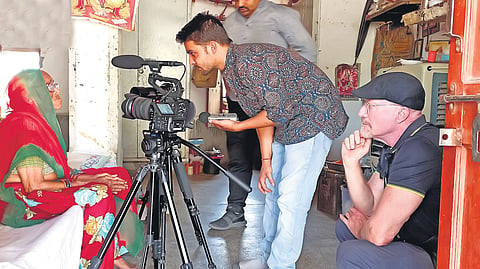The Purification of Hope
Twelve years ago, Hollywood director James Higginson took up a photography assignment at Nimba Nimbada Hospital in Jodhpur, encountering patients suffering from Hansen’s Disease (leprosy). Witnessing the lack of awareness about the disease and the extreme loneliness of the patients made him want to share their stories. The result is his upcoming documentary film, Shuddhi.
“It is not just a documentary; it’s an emotional journey, a call to action and a symbol of hope all rolled into one,” says the Berlin-based filmmaker currently touring India to promote the film. It will be screened at the Rajasthan International Film Festival on January 30, coinciding with World Leprosy Day.
The film, however, is not merely a social crusade for Higginson. It is also an act of empathy. The 66-year-old filmmaker was afflicted with Guillain-Barré Syndrome (GBS) in 2017, a rare condition in which a person’s immune system attacks the peripheral nerves. “I was nearly dead, but I managed to recover in two years. That phase increased my empathy for the disabled and making a movie on leprosy became the first thing on my (new) bucket list,” he says.
Higginson has written, produced and directed Shuddhi, which throws fresh light on the disease that affects over 5.2 million people globally. Sixty per cent of them live in India. The film touches on both the physical and emotional toll of leprosy, which is aggravated by social stigmatisation. The director, through the film, also propagates the universal message of self-love, tolerance, dignity and inclusion. The 40-minute docu-drama with a voiceover in Hindi is told through the eyes of Baba, a former resident of a leprosy ashram, who shares his wisdom with a grandson on the banks of the Ganga.
Incidentally, water bodies play an important part in the movie. Higginson says water has always fascinated him. “Do you realise that the water we have has been recycled for millions of years? Water holds stories and memories. I met Dhanji (one of the protagonists at the hospital) who expressed his desire to visit an ancient temple. But he has to undergo a cleansing ceremony to visit it. This sparked off the idea to tell my story through water as a metaphor,” he shares, adding that he spent four months last year travelling from Manali to Haridwar and Vrindavan to Jodhpur to shoot the film.
Higginson is best known for his award-winning experimental art film, Willful Blindness, in 2012. He followed this success with the documentary film, Devout, in 2016, which bore cinematic witness to the internalised struggle of a young Georgian Orthodox monk inside a remote monastery in Georgia. “I make films to address issues that expose human frailty,” says the director, who won an Emmy for the set decoration of Pee Wee’s Playhouse in 1987.
Shuddhi too follows this principle. “In the Hindu culture, purification ceremonies are performed by priests to heal the body and soul, bringing inner peace and tranquility. This film features the documented preparation and performance of the shuddhi ceremony, which allows Dhanji, a patient with Hansen’s Disease, to assume a state of purity before praying at an ancient temple,” Higginson says.

